I’m back! And what a month I’ve had. I know I always say that each holiday is “the BEST ever!!” but this time I mean it. I walked in deserts, I climbed lush mountains that reminded me of the Swiss Alps, I saw snow covered peaks while I was sweltering in 115 degree weather (47 Celsius). And history, so much history! I stayed on the Silk Road, the fabled eastern trade route that many have traveled before me, including the grand pubah: Marco Polo. It was very cool to be walking in the footsteps of these great travelers.
The Distances are Vast
I only traveled in two of China provinces, but I crossed almost half of the country. I flew to Lanzhou, in Gansu province which is considered the geographical center of the country. Then I took trains and buses 2,129 miles (3,426km) which is further than the distance between Chicago and LA. And I was only in TWO provinces.
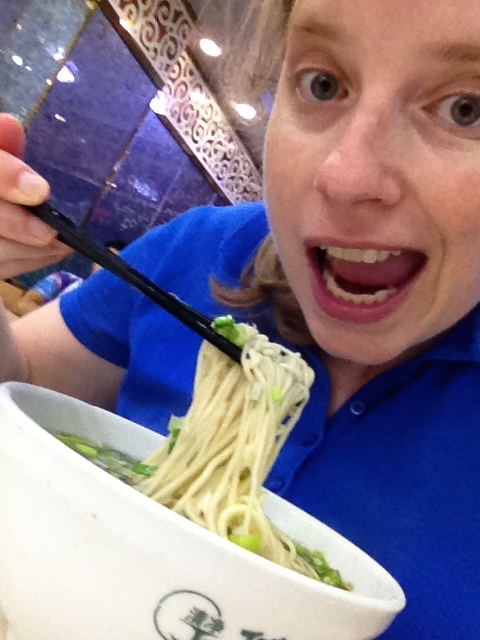
Most train rides were about 7-8 hours, the longest being 20. The worst train ride was between Zhangye and Dunhuang. It was seven hours in a seat on the old trains. If you’ve traveled in China you know the old trains have just one hard bench where 3 people sit. I got the aisle seat, and there were lots of people standing in the aisles so I had nothing to lean on. I ended up just slumping over my lap and managing a few fitful hours of sleep. When I went to the bathroom in the morning the toilet was covered in so much shit, I gagged. (I still used it though.) The twenty hour train ride with a bed and a wall socket was a breeze comparatively.
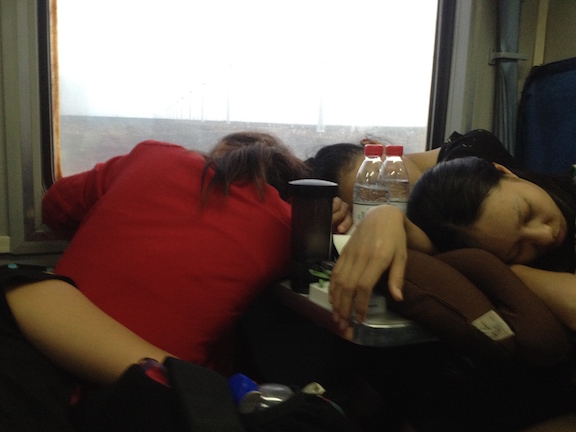
Traveling Resources are Few
Traveling in China is hella convenient. Public transportation is convenient and reliable. Hostels are newer and filled with helpful resources and English speakers. Tourist spots are well-known and easy to get to.
But not out west. I was surprised by the lack of all things. Train stations were often far away, sometimes hours away. And train times, incredibly inconvenient. I skipped one small town just because the train arrival times were 3am, 4am or 5am. Nothing else. (And the train were almost all the older trains, not the high-speed trains China is so famous for.)
Hostels weren’t much better. A place I figured would be teeming with travelers would have one, kinda crappy, hostel. Hostels in China are a relatively new thing and are usually clean, with a bright and eager staff. Not out here. They were old, tired and with very few helpful staff member (with a few exceptions of course).

And thank god I speak Chinese because I didn’t speak English once my whole first week. (I just didn’t see a westerner and no Chinese spoke English.) Even “international hostels” were filled only with Chinese and the staff couldn’t speak English. And even famous tourist destinations were confusing. I wanted to go to the Magao Caves, a UNESCO World Heritage Site, and had major difficulty. You couldn’t go to the site and enter, but had to pre-purchase tickets at a specific ticket office somewhere in town, and then get an appointment time. Even at the ticket office there wasn’t a lick of English and I managed to totally F the whole thing up and went the wrong time and day. Luckily I was saved by a very nice manager, but that was what happened to me, a Chinese speaker. I don’t know how other foreigners handled it.
That being said….
It was the Most Social of Trips I’ve Ever Had
Despite resources being so few, or perhaps because of, I ended up with a growing group of friends. Like I said, the Silk Road is well-known adventure and I’m not the only one who followed it. After that first English-free week, I met a Aussie named Daniel in one of my hostels as I was on my way to the next city. He was the first guy I had a conversation in English with. Who should I run into a few days later at my next hostel? Daniel. And who did I run into again while waiting in line to buy a ticket in Urumqi? Daniel. And who was the last person I said goodbye to before getting in a taxi to go back home? Daniel.

And it wasn’t just Daniel, but Jace, and Stephen, and a guy who has been riding his bike around the world for 8 years, and the British guy and Japanese girl. (I didn’t always get, or remember everyone’s names.) And the people I met had always met the other travelers, on buses, or trains, so entering a new hostel became a bit of a reunion. “Hey! I know you!” was the most common greeting.
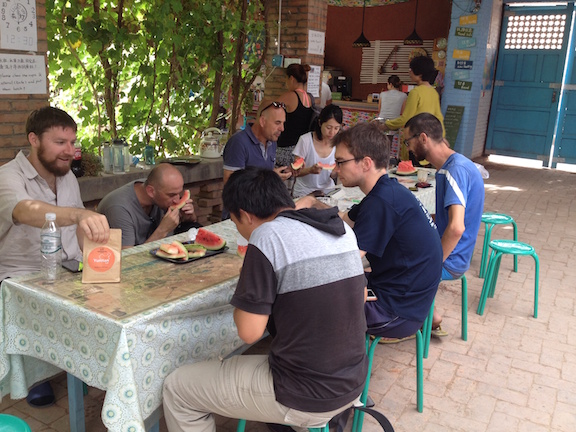
Everything Moved at Desert Time
Because China has only one time zone (Beijing time) and because Xinjiang is as far west as California to New York, they operated on their own casual time zone which was two-hours behind. Official businesses, like banks and trains, operated on Beijing time. Everything else was Xinjiang time. For instance restaurants were empty at 7pm and filled at 9pm. Bedtime was usually 1-2am, and you’d sleep in until 9 or 10 the next day.

But there was another even more causal pace to things: desert time. Because the places were hot, blistering hot at times, afternoons were quiet. There was plenty of activity in the mornings and early afternoon, and then evening. But the afternoon, when the sun was the brightest and the heat most intense, people stayed away. Travelers got into that rhythm too, and we would spend many afternoon hours in the shaded hostel courtyards just chatting all afternoon until the temps cooled down a bit. Lot’s of grapes and melons were eaten during those hours. Naps were taken. It was a great pace of life I fell into quickly.

Food
There will be many more posts on food next, but just a quick word on how ah-mazzzzing it was. Noodles was the order of the day, as was mutton. I began to miss vegetables and some fresh, light food, yet I also found myself craving the juicy grilled lamb kebabs dripping with fat or the wide, frisbee-like discs of nan bread. There were days where I ate mutton for breakfast and dinner and loved every bite.
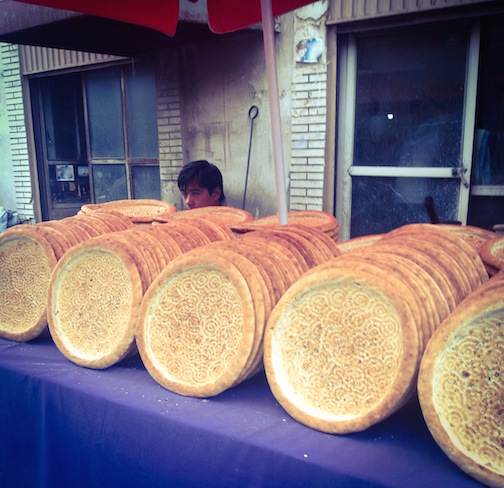
Weather
Remember how I said that I was going to try to get to cooler climates by heading west and up elevation-wise? Guess what, it didn’t work. Not only was the entire trip hot and dry, I ended up going to the hottest place in all of China. Daytime temps were almost always near 100 degrees F. (40 Celsius.) Because it was a dry climate the nights were cooler, but I wouldn’t go as far as to say cool. I wore my light sweater a grand total of one time. Luckily the places I went were lush and tree-filled so I managed to stay in the shade most of the time. Of course, the sun couldn’t be avoided and I had a wide-brimmed hat and sleeves for my arm to protect them. Didn’t really work and I got sun poisoning one day. Good news is I am now tanner than I have ever been in my life.

So, the next few posts will be filled with specific places and things I saw. I’m going to be light on the writing, and heavy on the pics because not much needs to be said. (Though I do want to write a bit about the Uighur people, who are muslim and ethnically align more with middle-easterners than Chinese, but otherwise mostly picture essays.) I am very glad to explore a totally unique and different part of the country I have called my home for so long. Stay tuned for more!
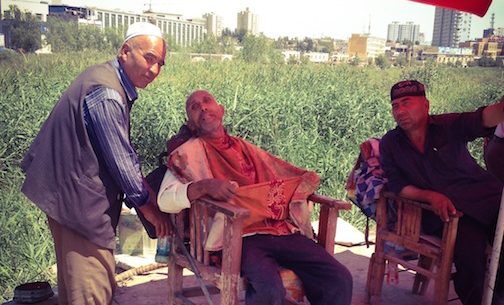


Hi Becky, Enjoyed reading you blog. We also followed the Silk Road this past summer. My son thought it was a brilliant way to travel by train over the plane. I had booked on line months in advance in the US and were fortunate enough to have the sleeper on the midnight train from Zhangye and arrive in Dunhuang at 8:00 am. I guess you were on the local train?
At some point when I decide to retire in my job in NYC, I would be interested in taking up a teaching position in China. Were there options of which school or region in China? or you just end up where you were instructed?
Thanks Nina! I think you should totally try teaching in China after you retire! You have all the options in the world where to go. You can research and contact schools directly so you know exactly what you are getting into. You could hire a recruiter (which is not at all recommended, they will trick you) but otherwise their isn’t anyone to instruct you where to go. It’s just like any job in any country, you apply to the school directly.
Research it more and I totally support you considering it!